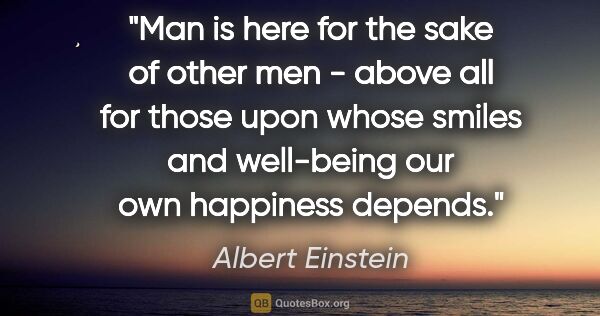Wellbeing Quotes (page 3)
I suffered no pain, my hunger had taken the edge off; instead I felt pleasantly empty, untouched by everything around me and happy to be unseen by all. I put my legs up on the bench and leaned back, the best way to feel the true well-being of seclusion. There wasn't a cloud in my mind, nor did I feel any discomfort, and I hadn't a single unfulfilled desire or craving as far as my thought could reach. I lay with open eyes in a state of utter absence from myself and felt deliciously out of it.
Knut Hamsun
The capacity to accept suffering for the sake of goodness, truth and justice is an essential criterion of humanity, because if my own well-being and safety are ultimately more important than truth and justice, then the power of the stronger prevails, then violence and untruth reigns supreme.
Joseph Ratzinger


Many are the lives of men unwritten, which have nevertheless as powerfully influenced civilization and progress as the more fortunate Great whose names are recorded in biography. Even the humblest person, who sets before his fellows an example of industry, sobriety, and upright honesty of purpose in life, has a present as well as a future influence upon the well-being of his country; for his life and character pass unconsciously into the lives of others, and propagate good example for all...
Samuel Smiles
Author describes one character's optimism as, that quiet well-being which perhaps you and I have felt on a sunny afternoon when, in our brightest youth and health, life has opened a new vista for us, and long to-morrows of activity have stretched before us like a lovely plain which there was no need for hurrying to look at, because it was all our own.
George Eliot
Love is about bottomless empathy, born out of the heart’s revelation that another person is every bit as real as you are. And this is why love, as I understand it, is always specific. Trying to love all of humanity may be a worthy endeavor, but, in a funny way, it keeps the focus on the self, on the self’s own moral or spiritual well-being. Whereas, to love a specific person, and to identify with his or her struggles and joys as if they were your own, you have to surrender some of your self.
Jonathan Franzen
Finally, I would like to assure my many Buddhist, Christian, Hindu, Jewish, and Muslim friends that I am sincerely happy that the religion which Chance has given you has contributed to your peace of mind (and often, as Western medical science now reluctantly admits, to your physical well-being). Perhaps it is better to be un-sane and happy, than sane and un-happy. But it is the best of all to be sane and happy. Whether our descendants can achieve that goal will be the greatest challenge of...
Arthur C. Clarke
Me as I think I am and me as I am in fact - sorrow, in other words, and the ending of sorrow. One third, more or less, of all the sorrow that the person I think I am must endure is unavoidable. It is the sorrow inherent in the human condition, the price we must pay for being sentient and self-conscious organisms, aspirants to liberation, but subject to the laws of nature and under orders to keep on marching, through irreversible time, through a world wholly different to our well-being, toward...
Aldous Huxley
The aim of education is to develop resources in the child that will contribute to his well-being as long as life endures; to develop power of self-mastery that he may never be a slave to indulgence or other weaknesses, to develop [strong] manhood, beautiful womanhood that in every child and every youth may be found at least the promise of a friend, a companion, one who later may be fit for husband or wife, an exemplary father or a loving intelligent mother, one who can face life with courage,...
David O. McKay
Every nation that has ended in tyranny has come to that end by way of good order. It certainly does not follow from this that peoples should scorn public peace, but neither should they be satisfied with that and nothing more. A nation that asks nothing of government but the maintenance of order is already a slave in the depths of its heart; it is a slave of its well-being, ready for the man who will put it in chains.
Alexis de Tocqueville